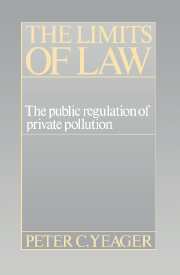Book contents
- Frontmatter
- Contents
- Preface
- Acknowledgments
- 1 The social production of business offenses
- 2 Bringing the law back in: an integrated approach
- 3 The politics of water: pollution policies to 1970
- 4 Contradiction and change: environmental consciousness and the mobilization of law
- 5 Legislating clean water: changing conceptions of environmental rights
- 6 Controls and constraints: from law to regulation
- 7 Enforcement: the social production of environmental offenses
- 8 Ecology, economy, and the evolution of limits
- Bibliography
- Index
6 - Controls and constraints: from law to regulation
Published online by Cambridge University Press: 23 May 2010
- Frontmatter
- Contents
- Preface
- Acknowledgments
- 1 The social production of business offenses
- 2 Bringing the law back in: an integrated approach
- 3 The politics of water: pollution policies to 1970
- 4 Contradiction and change: environmental consciousness and the mobilization of law
- 5 Legislating clean water: changing conceptions of environmental rights
- 6 Controls and constraints: from law to regulation
- 7 Enforcement: the social production of environmental offenses
- 8 Ecology, economy, and the evolution of limits
- Bibliography
- Index
Summary
The implementation of law is forged in the complex interplay of bureaucratic policy, court interpretations, and the forms of private compliance, a dialectic shaped by the forces evolving in the wider political economy. While true of law generally, the process of implementation is particularly dynamic and uncertain when the statutory guidance is culturally novel – threatening long-established patterns and relations – and technically complex from the standpoints of law, science, administration, or any combination of these. The complexity of law assures the vital play of discretionary judgment, while its novelty promises a key role to relations of power in the exercise of that judgment. Thus the implementation of law is inherently contingent and always problematic.
If novelty and complexity characterized much of the regulatory law drawn to control business behavior in the 1960s and 1970s, they did so nowhere more than in the 1972 amendments to the Federal Water Pollution Control Act. As I have already suggested, the Congress's vagueness regarding the ways and means of the law's “core technology” – the establishment of effluent controls for a multitude of industries and individual pollutants – meant that it was delegating key political decisions not only to the prominent office of the EPA administrator, but more important, to the less visible cadres of experts, legal, scientific and technical, down the agency' professional ranks. There, in the often arcane workings of bureaucracy, would the law finally be defined and the limits of its impact determined.
Information
- Type
- Chapter
- Information
- The Limits of LawThe Public Regulation of Private Pollution, pp. 176 - 250Publisher: Cambridge University PressPrint publication year: 1991
